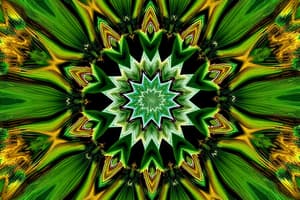Podcast
Questions and Answers
What can students identify at the end of the chapter?
What can students identify at the end of the chapter?
Patterns in nature and regularities in the world
What is the importance of mathematics in one's life?
What is the importance of mathematics in one's life?
Mathematics helps in various daily situations and problem-solving.
How is mathematics expressed and represented?
How is mathematics expressed and represented?
Through patterns, numbers, and logical arrangements.
Which of the following are examples of patterns in nature? (Select all that apply)
Which of the following are examples of patterns in nature? (Select all that apply)
The Golden Ratio is generally denoted by the Greek letter ______.
The Golden Ratio is generally denoted by the Greek letter ______.
What is a series in mathematics?
What is a series in mathematics?
Which term refers to a never-ending pattern?
Which term refers to a never-ending pattern?
Patterns in nature can only be sequential and spatial.
Patterns in nature can only be sequential and spatial.
What is a finite sequence?
What is a finite sequence?
Flashcards are hidden until you start studying
Study Notes
The Nature of Mathematics
- Mathematics serves as a valuable tool for exploring natural patterns and the environment.
- Patterns and numbers trace back to mathematics' origins, linking ideas to counting and regularity.
- Patterns in nature correspond to logic and reasoning; they aid in understanding the world.
- Mathematical patterns manifest in various forms including sequential, spatial, temporal, and linguistic.
- Regularities in life include recurring events like days in a calendar or months in a year.
Patterns in Nature
- Patterns are repeated designs or sequences following specific rules.
- Examples of natural patterns include the unique spots on a giraffe, illustrating variation within a pattern.
Types of Patterns
- Symmetry: Indicates harmonious proportion and balance.
- Spiral: A curve moving away from a central point while revolving around it.
- Meander: Regular sinuous curves found in rivers or streams.
- Waves or Riffles: Transfers energy through matter without mass transport.
- Foams or Bubbles: Formed by trapping gas pockets in liquids or solids.
- Tessellation: Tiling a plane with geometric shapes without overlaps or gaps.
- Fractures or Cracks: Separations in materials induced by stress.
- Stripes and Spots: Patterns of bands or spots of consistent width and color.
- Fractals: Infinitely complex patterns that are self-similar across different scales.
Uses of Mathematics
- Technology: Enhances navigation and prediction capabilities.
- Engineering: Essential in construction and robotics.
- Media: Applies to music, movie production, and electoral predictions.
- Medicine and Health: Involves pharmacy practices and surgical techniques.
- Finance and Business: Integral in banking systems and gambling strategies.
Important Concepts
- Fibonacci Sequence: Begins with 0 and 1, where each subsequent number is the sum of the previous two; commonly associated with natural patterns.
- Golden Ratio (φ): Represents an irrational number approximately equal to 1.6180339887, often found in design and nature.
- Sequence: A set of numbers arranged in a specific order; can be finite or infinite.
- Terms: Individual numbers within a sequence.
- Series: The sum of a sequence’s terms.
- Arithmetic Sequence: A sequence where each term increases by a constant value.
Studying That Suits You
Use AI to generate personalized quizzes and flashcards to suit your learning preferences.




